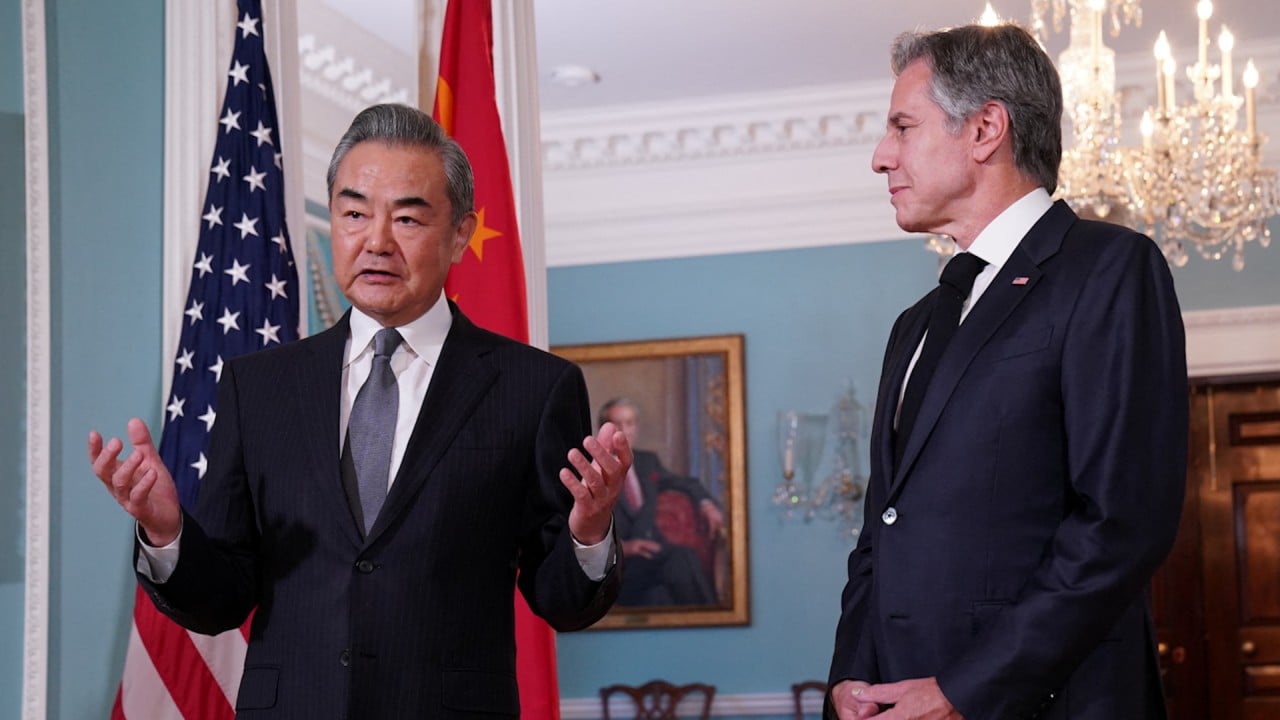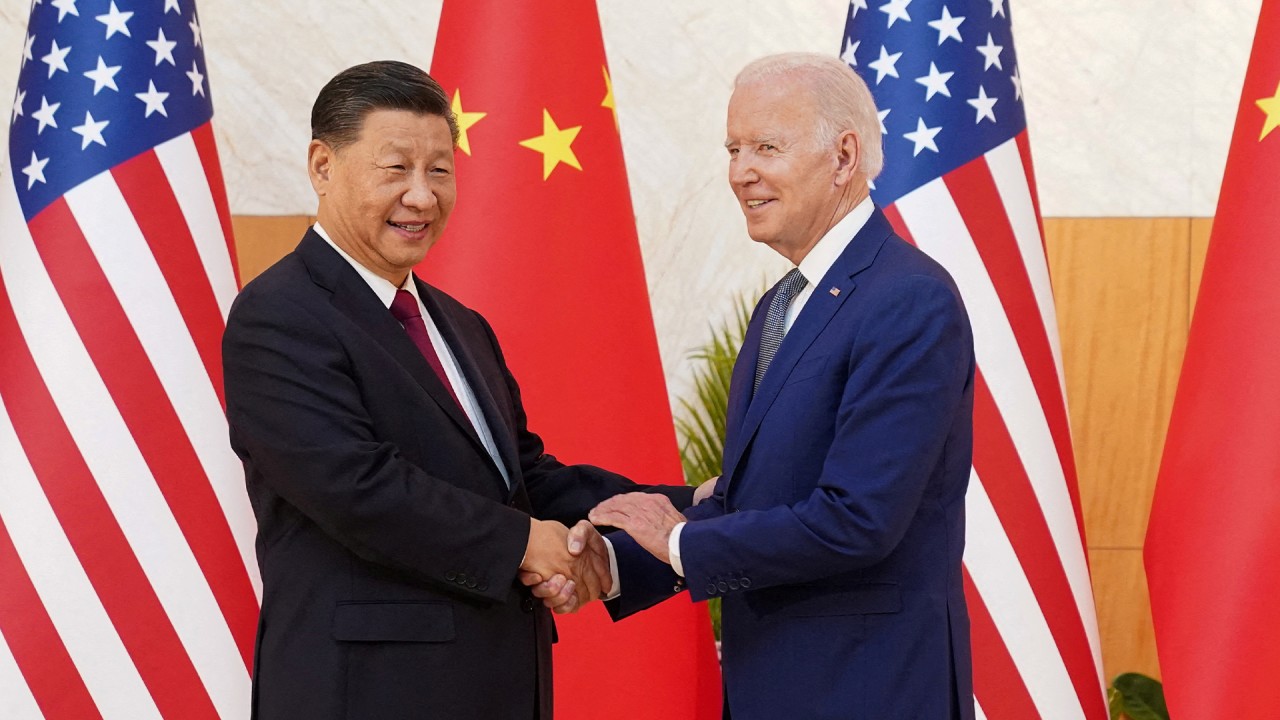
China, US must return to ‘healthy, stable’ ties ‘at an early date’, Foreign Minister Wang Yi tells Biden
- ‘We must act in a responsible manner’, Chinese Foreign Minister Wang Yi tells US President Joe Biden during hour-long meeting in Washington
- Wang’s visit is part of a bilateral push for a potential sit-down between Biden and Chinese President Xi Jinping on the Apec margins in November
China attaches great importance to the US and hopes to stabilise and improve bilateral relations, Wang told Biden, reiterating remarks made earlier during his trip starting on Thursday.
“We must act in a responsible manner toward the world, history, and the people, and follow the three principles of mutual respect, peaceful coexistence, and win-win cooperation as proposed by President Xi Jinping to truly stabilise and improve Sino-US relations,” Wang was quoted as saying by Chinese state news agency Xinhua.
These must be effectively maintained and not interfered with, he added.
Andy Mok, senior research fellow at the Centre for China and Globalisation, a Beijing-based think tank, said the position taken by Wang was reflective of his commitment that “whatever happens, China will respond calmly”.
“This shows China’s resolve and confidence in its objectives and approach, whether relating to domestic matters, like Xinjiang and Hong Kong, or global challenges such as tensions with the US,” Mok said.
Xinhua reported that Biden conveyed his greetings to Xi, and said the US was willing to maintain communication with China and jointly respond to global challenges.
A senior Biden administration official told reporters in a conference call that the two sides were indeed “making preparations for just such a meeting”.
Washington would “leave it to the Chinese side” to decide if and when the announcement will be made, given that Beijing often confirms trips made by leaders much closer to the date, the official said.
“A meeting between Xi and Biden would create a more positive atmosphere and optics that can set the stage for further improvement in relations,” said Mok, adding that recent developments had made the unconfirmed meeting “more likely”.
In another sign of improving rapport, the number of US-China flights will be increased again – to 70 per week from November 9, or 35 weekly round trips from the current 24 – the US Transportation Department announced on Friday.
This comes as mutual restrictions imposed during the coronavirus pandemic are further rolled back.
Wang’s visit also marks the first trip to Washington by a Chinese foreign minister since 2018, the year the US-China trade war began.
Wang said his visit aimed to follow through on the common understandings reached by the two heads of state at last year’s G20 summit in Indonesia.
He hoped the two sides would “proceed from the Bali summit towards a San Francisco summit, so as to prevent bilateral ties from further deteriorating and bring the China-US relationship back on the track of healthy and steady development at an early date”, according to the Xinhua report.
“The fundamental interests of the two peoples are also the common expectations of the international community,” he added.
The White House described the talks as a “good opportunity” in keeping lines of communication open between the two geopolitical rivals which have deep policy differences, adding that Biden emphasised the two countries’ “need to manage competition in the relationship responsibly and maintain open lines of communication”.
Mok said greater US-China interaction was important but Washington’s efforts to hobble the Chinese tech sector would hinder the potential for progress – even though California governor Gavin Newsom’s trip to Beijing was an example of “successful” diplomatic exchange.
Newsom, who on Wednesday became the first US governor to meet Xi in six years, said their talks were “indicative of a thawing”.
He also had a slate of meetings scheduled with several other high-level Chinese officials, which he hoped were a sign of bilateral relations entering “a new phase”.
But despite the diplomatic bonhomie, back room US efforts to contain China were still on, Mok noted.

Meeting Sullivan earlier on Friday, Wang said Taiwan independence was the greatest threat to the stability of the Taiwan Strait, as well as the greatest challenge to China-US relations.
The two also touched on the Israel-Gaza war, now in its third week after a deadly cross-border raid by Hamas militants sparked furious retaliation from Israel.
Israel ‘gone beyond self-defence’ in Gaza: Chinese Foreign Minister Wang Yi
The US has been steadfast in its support for Israel, while China continues to call for a ceasefire, and the “two-state solution”, with an independent Palestine.
“The draft does not reflect the world’s strongest calls for a ceasefire, an end to the fighting, and it does not help resolve the issue,” Reuters quoted China’s UN ambassador Zhang Jun as telling the council after the vote.
This came days after the US blocked a Brazil-drafted resolution calling for a pause in the fighting and humanitarian aid into the Gaza strip, saying it made no mention of Israel’s right to self-defence.
Additional reporting by Amber Wang and Mark Magnier



